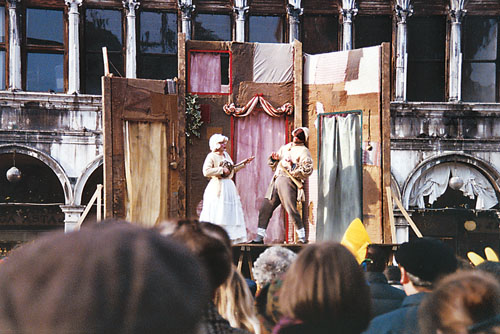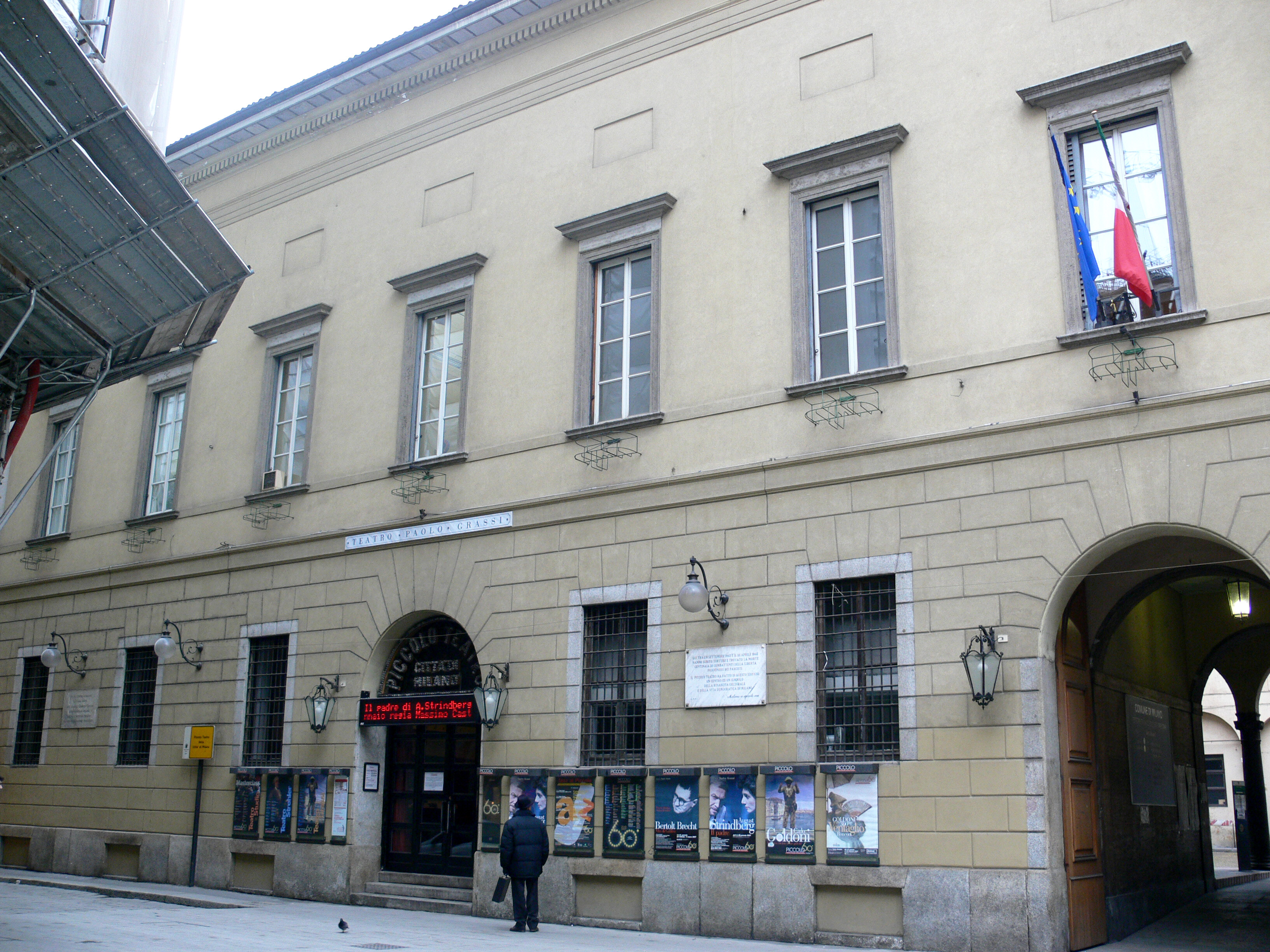|
Amleto Sartori
Amleto Sartori (3 November 1915 – 18 February 1962) was an Italian sculptor and poet from Padua most famous for his theater masks. First a sculptor, after the Second World War, Sartori began to fervently study the masks of Commedia dell'Arte which led him to a technique of modeling leather masks on wooden molds. His mask making techniques became famous, and his son Donato (1939 - 2016) later continued the work. Sartori became friends with Jacques Lecoq, who introduced him to the Piccolo Teatro in Milan, where he met Giorgio Strehler and Paolo Grassi. This was a turning point in Sartori's career, and brought him into contact with other artists such as Ferruccio Soleri and Marcello Moretti for the construction of masks for their theater productions. In 1979 his son Donato Sartori founded the ''Centro maschere e strutture gestuali'' in Padua, while in 2004, after his death, the International Museum of the Masks of Amleto and Donato Sartori ''(Museo Internazionale della Maschera ... [...More Info...] [...Related Items...] OR: [Wikipedia] [Google] [Baidu] |
Padua
Padua ( ; it, Padova ; vec, Pàdova) is a city and ''comune'' in Veneto, northern Italy. Padua is on the river Bacchiglione, west of Venice. It is the capital of the province of Padua. It is also the economic and communications hub of the area. Padua's population is 214,000 (). The city is sometimes included, with Venice (Italian ''Venezia'') and Treviso, in the Padua-Treviso-Venice Metropolitan Area (PATREVE) which has a population of around 2,600,000. Padua stands on the Bacchiglione, Bacchiglione River, west of Venice and southeast of Vicenza. The Brenta River, which once ran through the city, still touches the northern districts. Its agricultural setting is the Venetian Plain (''Pianura Veneta''). To the city's south west lies the Colli Euganei, Euganaean Hills, praised by Lucan and Martial, Petrarch, Ugo Foscolo, and Percy Bysshe Shelley, Shelley. Padua appears twice in the UNESCO World Heritage List: for its Botanical Garden of Padua, Botanical Garden, the most anc ... [...More Info...] [...Related Items...] OR: [Wikipedia] [Google] [Baidu] |
Mask
A mask is an object normally worn on the face, typically for protection, disguise, performance, or entertainment and often they have been employed for rituals and rights. Masks have been used since antiquity for both ceremonial and practical purposes, as well as in the performing arts and for entertainment. They are usually worn on the face, although they may also be positioned for effect elsewhere on the wearer's body. More generally in art history, especially sculpture, "mask" is the term for a face without a body that is not modelled in the round (which would make it a "head"), but for example appears in low relief. Etymology The word "mask" appeared in English in the 1530s, from Middle French ''masque'' "covering to hide or guard the face", derived in turn from Italian ''maschera'', from Medieval Latin ''masca'' "mask, specter, nightmare". This word is of uncertain origin, perhaps from Arabic ''maskharah'' مَسْخَرَۃٌ "buffoon", from the verb ''sakhira'' ... [...More Info...] [...Related Items...] OR: [Wikipedia] [Google] [Baidu] |
Commedia Dell'arte
(; ; ) was an early form of professional theatre, originating from Italian theatre, that was popular throughout Europe between the 16th and 18th centuries. It was formerly called Italian comedy in English and is also known as , , and . Characterized by masked "types", was responsible for the rise of actresses such as Isabella Andreini and improvised performances based on sketches or scenarios. A , such as ''The Tooth Puller'', is both scripted and improvised. Characters' entrances and exits are scripted. A special characteristic of is the , a joke or "something foolish or witty", usually well known to the performers and to some extent a scripted routine. Another characteristic of is pantomime, which is mostly used by the character Arlecchino, now better known as Harlequin. The characters of the usually represent fixed social types and stock characters, such as foolish old men, devious servants, or military officers full of false bravado. The characters are exaggerated " ... [...More Info...] [...Related Items...] OR: [Wikipedia] [Google] [Baidu] |
Jacques Lecoq
Jacques Lecoq (15 December 1921 – 19 January 1999) was a French stage actor and acting movement coach. He was best known for his teaching methods in physical theatre, movement, and mime which he taught at the school he founded in Paris known as École internationale de théâtre Jacques Lecoq. He taught there from 1956 until his death from a cerebral hemorrhage in 1999. Jacques Lecoq was known as the only noteworthy movement instructor and theatre pedagogue with a professional background in sports and sports rehabilitation in the twentieth century. Life As a teenager, Lecoq participated in many sports such as running, swimming, and gymnastics. Lecoq was particularly drawn to gymnastics. He began learning gymnastics at the age of seventeen, and through work on the parallel bars and horizontal bar, he came to see and understand the geometry of movement. Lecoq described the movement of the body through space as required by gymnastics to be purely abstract. He came to understand t ... [...More Info...] [...Related Items...] OR: [Wikipedia] [Google] [Baidu] |
Piccolo Teatro (Milan)
The Piccolo Teatro di Milano (translation: "Little Theatre of the City of Milan") is a theatre in Milan, Italy. Founded in 1947, it is Italy's first permanent theatre, and a national "teatro stabile", or permanent repertory company, and is considered a theatre of major national and European importance. The theatre has three venues: Teatro Grassi, in Via Rovello, between Sforza Castle and the Piazza del Duomo; Teatro Studio, which was originally intended to be the theater's rehearsal hall; and Teatro Strehler, which opened in 1998 with a seating capacity of 974. Its annual programme consists of approximately thirty performances. In addition, the venue hosts cultural events, from festivals and films, to concerts, conferences, and conventions, as well as supporting the Paolo Grassi Drama School. History Piccolo Teatro was founded by theatre impresario Paolo Grassi and actor and director Giorgio Strehler, along with Mario Apollonio, Virgilio Tosi and Nina Vinchi. According to Grassi, ... [...More Info...] [...Related Items...] OR: [Wikipedia] [Google] [Baidu] |
Giorgio Strehler
Giorgio Strehler (; ; 14 August 1921 – 25 December 1997) was an actor, Italian opera and theatre director. Biography Strehler was born in Barcola, Trieste; His father, Bruno Strehler, was a native of Trieste with family roots in Vienna and died when Giorgio was only three. His maternal grandfather, Olimpio Lovrich, subsequently became his father figure. Olimpio was one of the finest horn players of his day and the impresario of the Teatro Comunale Giuseppe Verdi, Trieste's Opera House. When he was seven, his grandfather died and he moved to Milan with his mother and grandmother. As a child, Giorgio was not impressed by theater. He found it "false" and decided it did not have the power to stir one's emotions as film did. His opinions changed one hot summer night while on his way to the cinema. He noticed a sign advertising the air-conditioning posted by the Odeon Theater. He walked in for some relief from the weather to see a performance of Carlo Goldoni's ''Una delle ultime ... [...More Info...] [...Related Items...] OR: [Wikipedia] [Google] [Baidu] |
Paolo Grassi
Paolo Grassi (30 October 1919 – 14 March 1981) was an Italian theatrical impresario. Grassi was born in Milan, Italy. As a young man, he worked in magazines and discovered a passion for the theater. It led him in 1937 to create a Bertoldissimo (musical work), which he oversaw and directed. He organized the theater company Ninchi-Dori-Tumiati and founded the avant-garde group Palcoscenico (Stage). Grassi was a Socialist. During the Second World War, he was conscripted into the army but went over to the Italian resistance movement, including working with the socialist newspaper ''Avanti!''. In 1947, with Giorgio Strehler, friend and associate, Grassi founded the Piccolo Teatro di Milano, the first Italian civic theater. It was later renamed, in his honor, the Teatro Paolo Grassi. In 1964, he purchased the Teatro San Ferdinando with Strehler, renaming it Teatrale Napoletana. From 1972 to 1977 he was superintendent of the La Scala theatre, while from 1977 to 1980 held the post of ... [...More Info...] [...Related Items...] OR: [Wikipedia] [Google] [Baidu] |
Abano Terme
Abano Terme (known as Abano Bagni until 1924) is a town and ''comune'' in the Province of Padua, in the Veneto region, Italy, on the eastern slope of the Euganean Hills; it is southwest by rail from Padua. Abano Terme's population is 19,062 (2001) (in 1901 it was 4,556). The town's hot springs and mud baths are an important economic resource. The waters have a temperature of about . History The baths were known to the Romans as '' Aponi fons'' or ''Aquae Patavinae''. A description of them is given in a letter to Theodoric, the king of the Ostrogoths, from Cassiodorus. Some remains of the ancient baths have been discovered (S. Mandruzzato, ''Trattato dei Bagni d'Abano,'' Padua, 1789). An oracle of Geryon lay near, and the so-called ''sortes Praenestinae'' (C.I.L. i., Berlin, 1863; 1438–1454), small bronze cylinders inscribed, and used as oracles, were perhaps found here in the 16th century. The baths were destroyed by the Lombards in the 6th century, but they were rebuilt an ... [...More Info...] [...Related Items...] OR: [Wikipedia] [Google] [Baidu] |
1915 Births
Events Below, the events of World War I have the "WWI" prefix. January * January – British physicist Sir Joseph Larmor publishes his observations on "The Influence of Local Atmospheric Cooling on Astronomical Refraction". *January 1 ** WWI: British Royal Navy battleship HMS ''Formidable'' is sunk off Lyme Regis, Dorset, England, by an Imperial German Navy U-boat, with the loss of 547 crew. ** Battle of Broken Hill: A train ambush near Broken Hill, New South Wales, Australia, is carried out by two men (claiming to be in support of the Ottoman Empire) who are killed, together with 4 civilians. * January 5 – Joseph E. Carberry sets an altitude record of , carrying Capt. Benjamin Delahauf Foulois as a passenger, in a fixed-wing aircraft. * January 12 ** The United States House of Representatives rejects a proposal to give women the right to vote. ** '' A Fool There Was'' premières in the United States, starring Theda Bara as a '' femme fatale''; she quickly become ... [...More Info...] [...Related Items...] OR: [Wikipedia] [Google] [Baidu] |
1962 Deaths
Year 196 ( CXCVI) was a leap year starting on Thursday (link will display the full calendar) of the Julian calendar. At the time, it was known as the Year of the Consulship of Dexter and Messalla (or, less frequently, year 949 ''Ab urbe condita''). The denomination 196 for this year has been used since the early medieval period, when the Anno Domini calendar era became the prevalent method in Europe for naming years. Events By place Roman Empire * Emperor Septimius Severus attempts to assassinate Clodius Albinus but fails, causing Albinus to retaliate militarily. * Emperor Septimius Severus captures and sacks Byzantium; the city is rebuilt and regains its previous prosperity. * In order to assure the support of the Roman legion in Germany on his march to Rome, Clodius Albinus is declared Augustus by his army while crossing Gaul. * Hadrian's wall in Britain is partially destroyed. China * First year of the '' Jian'an era of the Chinese Han Dynasty. * Emperor Xian of ... [...More Info...] [...Related Items...] OR: [Wikipedia] [Google] [Baidu] |



